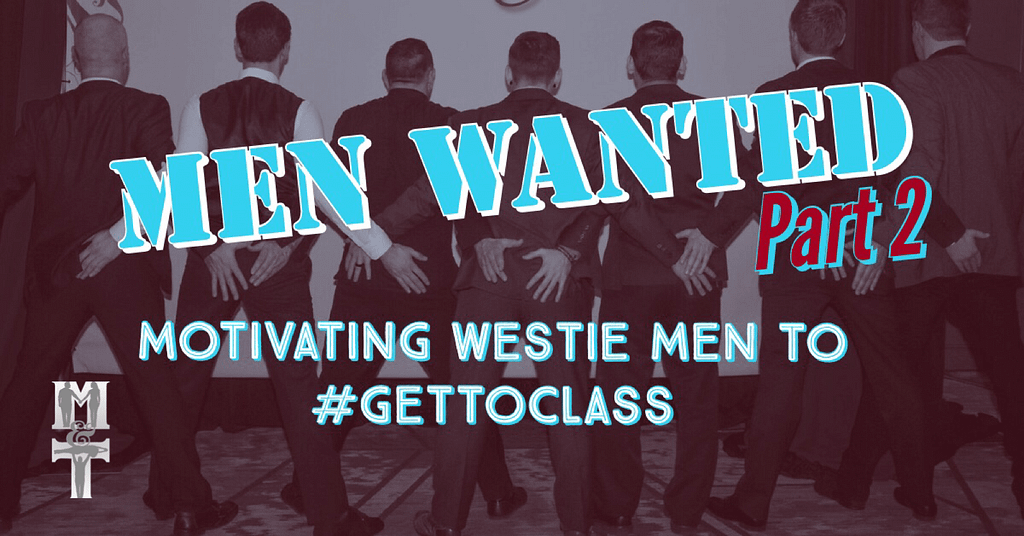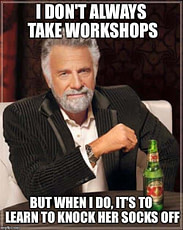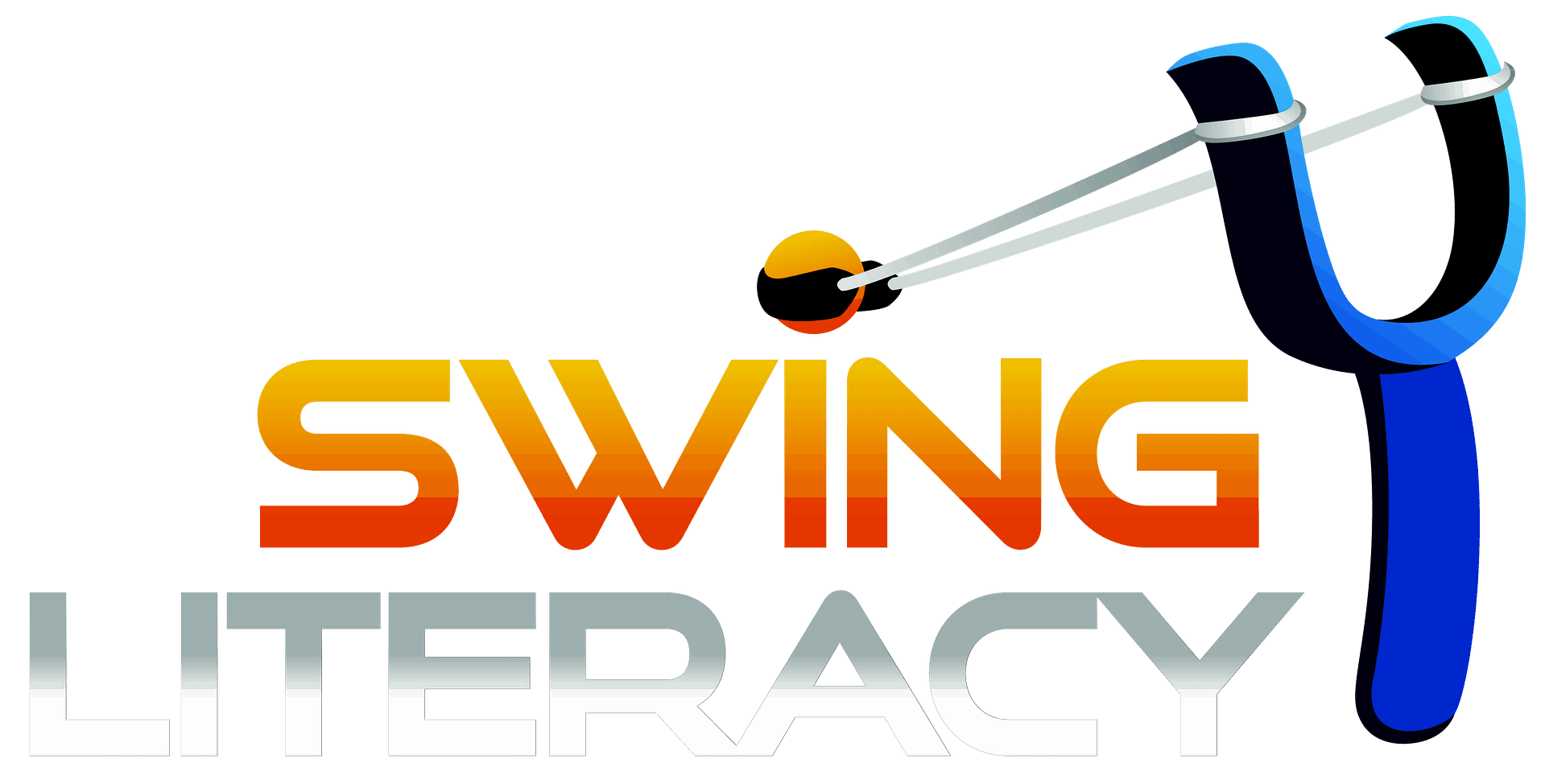No products in the cart.

Men Wanted! (Part 2) Motivating Westie Men to #gettoclass
Reading Time: minutes remaining
We asked WCS MEN to tell us what would get them into class. You might be surprised what they had to say! Teachers and promoters: you’re going to love me – be sure to read to the end.
It’s global phenomenon: most West Coast Swing scenes in the world struggle to attract men to try WCS in the first place, then struggle again to keep them training. How can we increase the involvement and engagement of men in WCS activities? (specifically men, not leaders)
To gather intel, I submitted a post on the Facebook group, Westie Discussion of Day, asking for MEN to answer only, about what initially motivated them to try WCS and what motivates them (or de-motivates them) to engage in classes/parties/privates/workshops.
The responses were honest, generous, and useful! In fact, this was SO useful, I decided to break it up in to two parts:
Part 1: Attracting men to try WCS: Read it here!
Part 2 (this article): What Motivates Westie Men to #gettoclass is focused on increasing men’s engagements in all WCS activities, but specifically learning.
Thank you to everyone who contributed. In fact, many men offered suggestions of their own accord, which I also included. I sorted through them all and noticed themes emerging. I could have paraphrased them, but I chose not to because I felt their direct quotes communicated their intention better, allowing readers to get a better understanding of how these men feel.
After each set below, I contribute my two cents, add a few links to relevant articles, and mix in some comments from my resident expert male, Myles, his retired dance teacher dad Ian Munroe, and our veteran Champion friend, Demetre Souliotes.
FYI, there’s a TON of suggestions in here that apply to any new dancer, not just the men.
In fact, I’ve also included a cool free bonus resource at the end of this article, that will help answer a lot of your questions about how to market to your community.
Why am I “giving away all these secrets”?
- The whole dance world would benefit from attracting more dancers. More dancers = bigger community = more abundance for everyone involved!
- You might not know this about me, but in my pre-dance career as a competitive swimming coach, I was responsible for the recruitment and engagement of all of the swimmers and their families for whatever program, clinic, swim meet, or training camp I wanted them to attend. So I’ve had a lifetime (and training) in marketing sports & leisure.
- The teachers that we train are in the business of attracting new dancers, so we go above and beyond to support them both in how to do it effectively and efficiently, and in how to use Swing Literacy methods to guarantee they keep coming back and improving consistently.
- This article is only to vocalize the needs and concerns of male Westies. Yes, solutions are available! If you’d like to know exactly how to creating marketing strategies and programming that serves their needs and concerns, be sure to scroll all the way to the bottom to discover how.
Disclaimer:
The roles of leader or follower are irrelevant in this article, as is gender identity. I specifically was interested in men’s responses, but I did not preclude or filter out any responders. I did not specify roles, so responders were free to describe their experience from either role.
Swing Literacy does not endorse the comments made by the responders – they do not reflect the position of Swing Literacy.
This data is imperfect! Of course this is a small sample set of men, and all are English-speaking. My purpose was not to collect accurate data: my purpose was to get a basket-full of suggestions from men willing to contribute to solving this global dilemma. I encourage all dance teachers and event promoters to pay attention and analyze for themselves what these men had to say.
Here are the 5 questions I asked the men:
- What first attracted you to learn WCS? (answered in Part 1, along with their offered advice)
- What inspired you to get more intentional in your learning? (Part 2)
- What is holding you back from taking more classes/workshops/privates? (Part 2)
- What marketing messages backfire on you/ offend you? (Part 2)
- What would make a difference for you now? What would inspire you now to study more? (Part 2)
Question #2
What inspired you to get more intentional in your learning?
“Growth Mindset”
- I’ve danced other genres before and found WCS to be challenging yet refreshing.
- To go from dancing patterns within a strict 8-count timing to being unrestricted and free was a game changer for me
- Having already done martial arts training and Ceroc I was already confident in my ability to learn physical disciplines and knew the rewards of putting in the effort.
- The videos I watched on YouTube of pros dancing inspired me to learn more and improve my dance.
- Compared to my ballroom experience, it was more for fun to push out of my comfort zone than to be the best. WCS provides that.
- The desire to improve.
- I knew I sucked. I was a good athlete in other sports and used to being coached and practicing, so once I realized WCS was not easy and the only way I was going to get better was to work at it, I was hooked.
- Workshops and classes are always inherently motivational.
“Status/Recognition”
- There is a hierarchical element to dancing: the fact that women like dancing with men who are good leaders is an incentive for me to improve.
- I think my motivation for dancing fires up the most when I have to audition for a performance troupe or train for a competition.
- Pursuing competitions really woke me up to more practice. My dancing sucks. Whatever I achieve falls short as my goals keep getting higher.
“Addiction”
- I became addicted. It is my only form of exercise really.
“Support”
- My peers motivate me. Just having people around my area, same age range.
- Challenges to grow and people around. I have a lot of habits and people around help me overcome them.
- The patient and gracious support from follows and teachers that I’ll always be grateful for.
- Good teachers and positive recomendations are important to me.
- One of the more veteran dancers in my area had reached out to me for private lessons as well, so that helped out.
“Inspiration”
- Seeing the people I started dancing with getting better drove me to take my first private lesson.
- The moment I decided I could be pretty good at it, but felt that there were too many things I could never do because I didn’t know how to execute them.
- I got inspired by a community which felt that showing their love for dancing would be enough to attract even the most darkest, sceptic soul. (Thank you, great Westies of Hungary..!). That automatically triggered my internal system to at least be on their level and practice beyond what was already given. Positive role models seriously go such a long way!!
Ok, let's discuss:
- All motivations are valid. Your motivation set is not going to be precisely the same as your friends’. Teachers and promoters need to recognize that their students’ motivations are varied, and not necessarily the same as their own.
- Notice how many comments above are directed at “Support” and “Growth”, as opposed to “Competition”. Some are motivated by the competition results, but more are motivated by the improvement results and challenge experiences, regardless of competition.

Question #3
What is holding you back from taking more classes/workshops/privates?
“Time & Money”
Time & Money was the resounding most popular answer, mentioned by almost every respondent.
- Holding me back now is money lol. I’d take a lesson every week if I could.
- Out of time. To take a new class, I have to sacrifice something else. Never an easy decision.
- It’s mostly just a time-thing
- It’s illogical to take privates and travel to attend classes if you don’t have time to put in the work during your remaining free time.
- It’s also a money vs commitment issue as well: if you can accept the hourly rate, but you can’t commit to practicing afterwards, then it’s a pretty bad investment.
- For private lessons, the price is the main point stopping me from taking more. I still try to take them regularly though.
“Not seeing results”
- The feeling that despite all the classes/workshops I still don’t improve and very little of what I’m taught in class appears to be useful or improve my dancing.
- It seems to often to be the “same old same old” often hyped and marketed as game-changing and mind blowing but actually making very little if any practical difference to my mediocre dancing.
- The committed guys already go to these things. Someone not as committed is not likely to gain from it, so why would they be motivated?
- Many practices focus on competing: dancing 60 seconds and have others offer feedback. While that’s great, I’d rather work technique or something that I’m struggle on with someone for 15-30 mins but that gets boring for them.
- I think I need to practice and process the information I get rather than do more classes.
- I used to do group classes but haven’t done one in at least 5 years, I find them boring.
- For Classes/Workshops, the only thing holding me back is (lack of) leveling. Often times, it’s impossible for instructors to prepare content that works for everyone because the workshop allows people from different levels to attend. Leveled workshops on the other hand, are great.
“Feeling discouraged by others”
- It has been my experience that men are more fearful and fragile on the dance floor than women (which is why at weddings men dance after they have had a few drinks). Men need to be encouraged to dance and supported when learning. if you make a man feel foolish, he will never come back.
- Let the teacher do the instruction and just compliment men for their effort. If you are a follower – DO NOT correct the leaders. Just be supportive.
“No pressure to improve to be popular”
- Most men don’t take privates to improve because they simply don’t *have* to improve in order to be asked to dance a lot. Because there are so many more women then men, men know that they can have a dance every time the music plays regardless of their level. Women know that the better they dance the more often they are asked so they take lessons to improve.
“Lack of qualified teachers”
- I have always disliked workshops because of the amount of self-appointed teachers who present.
- No quality teaching in the area holds me back: there ain’t enough hours in a day to travel enough to find classes outside my area.
Ok let's discuss:
There is some truth to the notion that men feel less pressure to improve because they are always in demand even if they have weak skills. But this is an excuse. In order to engage the men, attention needs to be focused on creating a supportive, motivating environment and producing results. These are the two guaranteed products of the Swing Literacy Teacher Development Program.

Question #4
What marketing messages backfire on you?
“Sexist/Objectifying Messages”
- Overtly sexist ones i.e. “We have lots of sexy women in our classes” (I don’t care, I’ve had minimal/zero success romantically as a result of dancing),
- Unless you are running a dating agency or a strip club on the side, STOP, STOP, STOP, advertising the women in your classes as objects that guys can meet!!!! I’m not saying people don’t meet while dancing, but it’s pretty deflating to walk into a new class, get asked if I’m single and hear the comment “we have a lot of great single ladies here for you to meet” before ever asking what class I’m interested in. Those are the studios/classes I don’t return to.
- Most of my guy friends also fit the ideal dance-potential demographic, the reason they don’t go or only do a class or two? They already have a significant other so the whole “dance with a pretty woman” line does nothing to interest them. They think it will cause friction later one even though their wives/GF’s are encouraging them to join me at a dance class. They will choose their relationship over dancing every time.
- Personally, the only thing that puts me off dance schools is if they market “meeting people” (generally implying a romantic partner) as an important function of the school. I go to dances to dance. I know other people seek connection in different ways and I am not opposed to it, but for me I’m interested in dancing.
“Bait and Switch”
- Saying you’re going to teach something that may have interested me and then just teaching something you just taught last week. Don't lie to me.
“Credit for novelty instead of skill”
- The major hype given to role switching and juniors. It is evident to me that this is the way the dance is progressing and so be it, but let’s eliminate the kudos for role switching and the cute factor when judging comps. I have seen many times a deserving leader or follower was bypassed for less deserving dancers who had these gimmick factors.
“Sloppy marketing and business operations”
- If you are running a business, run it like a business: make it easier for us to pay. If you don’t accept credit/debit cards and it’s cash only? I wonder are if you are serious about being a professional. This shocks me. I’m trying to give someone money and they make it harder to do that.
- Frequent spelling/grammar/punctuation errors shows that you did not care enough about your business to proofread. Why should I pay attention to a business that doesn’t care enough? It also sends the message that you think your customers are not smart enough to notice, which is alienating to me, because since I am smart enough, I’m going to think this message must not be aimed at me.
“Overly fluffy messaging”
- Aside from simple notifications of dance events, most attempts to “market” to me I find mildly offensive.
- Just make it exciting but not overly exciting, state the facts, what will we get out of it. We’re not really interested in the glamour of things.
- I’m not big fan on the cute titles: “Be sassy”, “Spice it up” or things like that. Just tell me exactly what topic it’s going to be on. The more specific the better. Having a cute title tells me nothing so I’m more apt to skip it, thinking it’s geared towards the follower.
“Gender-based assumptions”
- “Real men need to dance like this”, “Real men dance”. Yawn. Cringe. Men are men, some of us dance, some of us don’t. Some like football, some are indifferent to it. We’re not a homogeneous mass of clones.
- Don’t expect us to be there to “please and seek approval of women”, because we already have this stumped in our system from a very young age.
- “Men, if something’s wrong on the dance floor, leaders are always wrong, your followers are always right.” I feel that this is not happening much anymore -now the message is more partner/role focused: “How to achieve a much better relationship between the 2 partners” (The only way to go in my opinion). Every time I heard this in an introductory class I felt really good about being part of the group.
Ok let's discuss:
There were a lot of passionate comments against using women to attract men to dance classes. Just in case you didn’t get the message loud and clear: Using women to try to attract men to dance classes = bad idea and it makes you look bad.
I think this also applies to leader-begging: When the class registration numbers are so imbalanced that you need to recruit more leaders, it always makes me itch when the messages I see are desperate, like “Look at all these lonely followers that need more men to partner with!”. Ugh.

For those who might not realize, this is a “meme” created for sarcastic humour.
In case this isn’t obvious, it’s sexist. Start promoting more in advance, be more intentional in listing the benefits for the leaders, cap your numbers if necessary, and simply announce when the followers’ side is full. If the leaders don’t show up, change your lesson/series plan to fit who actually shows up.
Before you publish each piece of marketing content, get a proofreading opinion from multiple genders, not only to catch potential faux-pas, but also to learn more about how your messages are received.
Question #5
What would make a difference for you now? What would inspire you now to study more? ?
“Results”
- Teachers/Promoters keeping their word
- Classes which actually did improve my dancing and gave me skills/techniques that are actually useful.
- At the moment, the most useful and interesting dancing activity I’ve discovered is learning to follow. It’s very challenging, I’m learning so much and I really enjoy it. Whether it improves my dancing remains to be seen.
- To be honest I’m probably a lost cause when it comes to getting any better.
- Currently, I’m interested in a base techniques (e.g. weight transfer, how everything works) and applying it to patterns. This gives an ability to “create” nuances.
- What inspires me now is to stay healthy enough to continue to dance as long as I can and maybe improve some along the way. That’s why I continue to learn and compete to push myself and to continue a hobby I truly enjoy.
- Workshops with reputable teachers with a proven track record of being great teachers, not just great dancers.
- Leader-skill-focused classes.
“More Improved Social Aspect”
- Aside from a margarita machine??
- I like the social element of dancing. I like building a group of people united by dance when I am teaching or running a social dance or whatever.
- Events where I can dance with my friends.
“More Time/Money”
- Somehow getting more money to take more lessons
- I can dance 7 days a week, but I need some down time. But I would study more if I was a teacher.
- This is a great question. I’ve been in a rut for a couple of months now. While I’ve chalked it up to my work schedule, home repairs, just life in general. Maybe I’m just using those as an excuse?
- Inspiration is not the problem on my end, it’s more the lack of resources
“More Opportunities”
- Previously, a lack of socials was often something that made it hard to invest more time into WCS, but my community has grown to the point where 6-day dance weeks are almost a normality.
- I’ve moved cities again and found a new class. I suspect motivation will increase as I get to know my new community and perhaps as particular events (competitions, flashmobs) appear on the horizon.
- I wish I had weekly Jack and Jill’s. I’d settle for monthly even. We don’t have weekly WCS dances in my city. Nearest city that does is 300km away. Have been dancing whatever I could find in my current city.
- Always looking forward to my next workshop. Love technique classes especially body movement.
- I would be able to study more if/when there would be more local social dance options.
“More Support”
- I think having a regular dance partner that I could practice with weekly would improve my dancing a lot more than attending yet more classes/workshops on my own and forgetting the stuff I’ve just learnt 5 minutes after leaving the class.
- Having a competitive community really helps with motivating me to improve, and having a lot of dancers around the same level is a big plus.
- I’m not really good to answer this one. I’m studying as much as I can.
- Being able to dance and discuss various parts of the dance with peers would also inspire me to get better at my craft.
Ok let's discuss:
- Tell the men exactly what they are going to get/learn/benefit from the upcoming class/workshop/private. The women can figure it out. The men need it itemized in a table of actionables. Even though you will be teaching technical and artistic content, it doesn’t work to describe things the men can’t appreciate yet. Describe the tangible things they can relate to and want, but deliver the intangibles that they need.
- Focus on getting the men to enrol, and the women will show up regardless.

Men’s advice about how to market to Westie men
- I think the key to retain men is to make it fun and playful, gradually upping the level and/or adapt to what’s most beneficial for the group.
- Communication, be supportive, perhaps overly in the begining – by putting in effort/energy into making the leaders feel good they are more likely to reflect it back.
- Make lessons conveniently timed, located, and value for money.
- Link them to a social events or competition.
- Privates can be difficult, simply because not everyone believes in spending way too much money on a one hour training session. Workshops will work only when they feel welcomed, which can be working when there’s already a family-like community present.
- Even though the majority of classes are pattern focused, give the men something to challenge themselves with, be it musicality or mixing patterns up on the fly, we love that!
Extra Wisdom
(Got any ideas or suggestions to add? Please add your own in the comments below!)
Your marketing messages should be different for each demographic you are marketing to. The benefits and features you advertise to attract a not-yet-dancer should be customized and completely different from those you use to engage and motivate existing dancers.
Attracting dancers is a totally different ball game from retaining dancers. Student retention and engagement is the #1 concern of teachers we talk to – so know you’re not alone! Everyone wants to know how to keep students on a path to progress.
Students need to continually have their needs met in order to stay hooked. The early stages are critical for developing a growth mindset and community-minded attitude. They need to be explicitly shown the correlation of how their learning directly influences their enjoyment, and there is a magic formula that ensures this.







